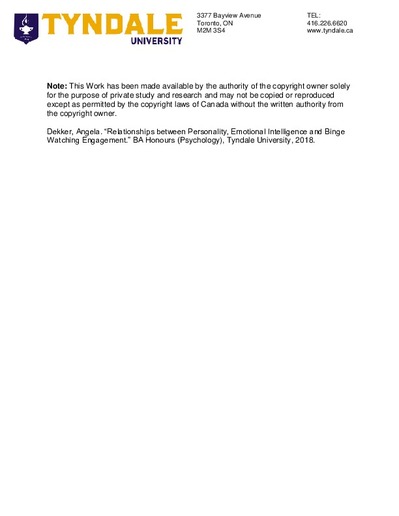| dc.rights.license | Attribution-NonCommercial-NoDerivatives 4.0 International License | en_US |
| dc.contributor.advisor | Ross, Nancy (Advisor) | |
| dc.contributor.author | Dekker, Angela | |
| dc.date.accessioned | 2020-12-23T19:07:33Z | |
| dc.date.available | NO_RESTRICTION | en_US |
| dc.date.available | 2020-12-23T19:07:33Z | |
| dc.date.copyright | 2018 | |
| dc.date.issued | 2018-04 | |
| dc.identifier.citation | Dekker, Angela. "Relationships between Personality, Emotional Intelligence and Binge Watching Engagement." BA Honours (Psychology), Tyndale University College & Seminary, 2018. | en_US |
| dc.identifier.uri | https://digitalcollections.tyndale.ca/handle/20.500.12730/328 | |
| dc.description | Bibliography: leaves 62-69. | en_US |
| dc.description.abstract | This study sought to measure the relationship between television binge watching engagement and individual characteristics such as personality and emotional intelligence. It was predicted that binge watching engagement would be related to scores on the Big Five personality scale and a trait measure of emotional intelligence. Positive and Negative Affect (mood), Transportation (mental involvement), and Parasocial Relationship (character connection) scores were all considered engagement variables. Other demographic factors such as Religiosity, Gender, and Hours of Television Consumption Per Week were expected to be related to these binge watching engagement factors. It was found that those who scored high in Conscientiousness were less likely to be mentally involved (transported) into the narrative of the television show than those who scored low on Conscientiousness. Additional testing found that those who scored higher in Neuroticism and Agreeableness were more likely to have lower Positive Affect Scores than those who scored lower in Neuroticism and Agreeableness at the end of binge watching. Those who scored high in Emotional Intelligence also scored higher in Positive Affect and lower in Negative Affect than those lower in Emotional Intelligence. Participants completed the study with less Positive and Negative Affect than when they arrived.
This research confirmed the relationship between a person’s binge watching experience and some individual differences. Implications television’s effects through mental involvement (transportation) and emotional affect are considered in the discussion. | en_US |
| dc.description.tableofcontents | Abstract -- Introduction -- Methods -- Results -- Discussion -- Conclusion -- References -- Appendixes | en_US |
| dc.format.extent | 81 leaves | en_US |
| dc.format.mimetype | application/pdf/ua | en_US |
| dc.language.iso | en | en_US |
| dc.publisher | Tyndale University College & Seminary | en_US |
| dc.rights | Copyright, Angela Dekker, managed by Tyndale University. All rights reserved. | en_US |
| dc.rights.uri | https://creativecommons.org/licenses/by-nc-nd/4.0/ | en_US |
| dc.subject.lcsh | Binge watching (Television) | en_US |
| dc.subject.lcsh | Emotional intelligence | en_US |
| dc.subject.lcsh | Personality | en_US |
| dc.subject.other | Dissertations, Academic--OWOBC--Tyndale University | en_US |
| dc.title | Relationships between Psychology, Emotional Intelligence and Binge Watching Engagement | en_US |
| dc.type | Thesis | en_US |
| dc.contributor.affiliation | University College | en_US |
| dc.contributor.committeeMember | Ross, Nancy (Committee Member) | |
| dc.contributor.department | Psychology | en_US |
| dc.contributor.repository | Tyndale University, J. William Horsey Library, 3377 Bayview Ave., Toronto, ON, M2M 3S4, Canada. Contact: repository@tyndale.ca | en_US |
| dc.date.digitized | 2018 | |
| dc.identifier.bibrecord | https://tyndale.on.worldcat.org/oclc/1129253906 | en_US |
| dc.rights.holder | This Work has been made available by the authority of the copyright owner solely for the purpose of private study and may not be copied or reproduced except as permitted by the copyright laws of Canada without the written authority from the copyright owner. | en_US |
| dc.subject.keyword | Personality | en_US |
| dc.subject.keyword | Binge watching (Television) | en_US |
| dc.subject.keyword | Emotional intelligence | en_US |
| dc.subject.keyword | Social learning theory | en_US |
| dc.subject.keyword | Cultural theory | en_US |
| dc.subject.keyword | Participant Binge Watching Questionnaire | en_US |
| dc.subject.keyword | Big Five Inventory | en_US |
| dc.subject.keyword | Trait Emotional Intelligence Questionnaire Short Form | en_US |
| dc.subject.keyword | Binge Watching Experience Questionnaire | en_US |
| dc.subject.keyword | Positve and Negative Affect Schedule | en_US |
| dc.subject.keyword | Post-Binge Watching Session Questionnaire | en_US |
| dc.subject.keyword | Netflix Binge Scale | en_US |
| dc.description.note | For AODA accommodation, including help with reading this content, please contact repository@tyndale.ca | en_US |
| dc.degree.level | Bachelors | en_US |
| dc.degree.name | Bachelor of Arts Honours (BA Honours) | en_US |
| dc.description.degree | Thesis (BA Honours)--Tyndale University College & Seminary, 2018. | en_US |


